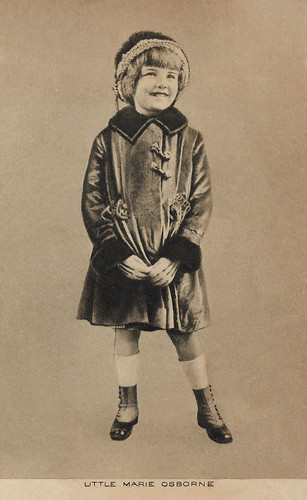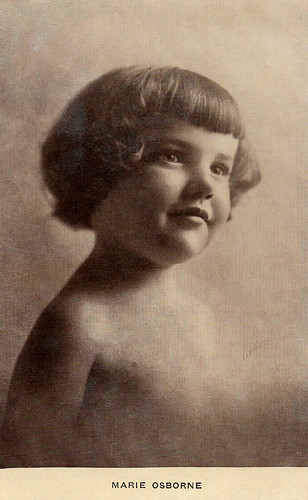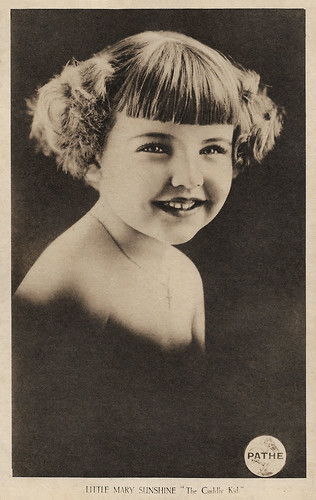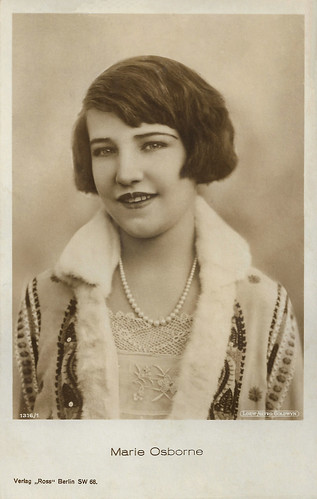
British postcard by Pathé Frères Cinema Ltd Series. Pathé Exchange was the distributor of Marie's films.

American postcard by Kraus Mfg. Co., N.Y. Photo: Pathé. Publicity postcard for a screening of Daddy's Girl (William Bertram, 1918) in the Town Hall in Danville.
A lucrative contract with Balboa Films by the age of five
Born as Helen Alice Myres in Denver, Colorado, the daughter of Roy and Mary Myres. She soon became — under mysterious circumstances — the child of Leon and Edith Osborn, who added the 'e' to her surname, apparently to obscure the adoption. At the suggestion of her foster mother, the girl's name was changed to Marie. Her real father was H.L. Shriver, a man who became a tycoon and left her a substantial inheritance on his death. She was unaware that he was her father until after he had died.
Her foster parents, the Osbornes, introduced their daughter to silent films when they left Colorado to work at Balboa Amusement Company in Long Beach, California. Unable to afford a babysitter, her parents took Baby Marie to the studio. While her parents worked, the little girl played at the studio, and she soon was discovered by actor-director Henry King, who in fact was looking for a boy actor. It was her Dutch bob haircut that attracted his attention.
She was cast as a male toddler in 1The Maid of the Wild (Sherwood MacDonald, 1915) with King acting, She was signed to a lucrative contract with Balboa Films and by the age of five, she was starring in silent films. She went to work with Henry King and writer Clara Beranger. Osborne made her debut credited as Baby Osbourne in the short drama film Kidnapped in New York (J. Stuart Blackton, 1914) starring Barney Gilmore and produced by King.
Her best-remembered film, is Little Mary Sunshine (Henry King, 1916), with King in the male lead. It is also one of her few films which still survive on celluloid. Some of her other films are Sunshine and Gold (Henry King, 1917), When Baby Forgot (Eugene Moore, 1917), Daddy's Girl (William Bertram, 1918) with Lew Cody, Winning Grandma (William Bertram, 1918), The Sawdust Doll (William Bertram, 1919), and Daddy Number Two (dir. unknown, 1919).
At the age of eight, she completed her final film as a child star, Miss Gingersnap (William Bertram, 1919). In all, she was featured or starred in 29 films in a six-year period, including some 7 films directed by Henry King. Most of her films were produced at Diando Studios, the former Kalem Movie Studio in Glendale, California.

British postcard in the Pathé Frères Cinema LTD Series. Photo: Pathé. Marie Osborne in Little Mary Sunshine (Henry King, 1916). Caption: The cuddly kid.
16 years working as an extra or as a stand-in
Marie Osborne returned to motion pictures 15 years later. When her first marriage was in trouble, Osborne decided to find work once again in films. She contacted her former mentor, Henry King, asking him to help her find a job. He aided her in obtaining a card with Screen Actors Guild and she registered with Central Casting Corporation.
She appeared as an extra in his film Carolina (Henry King, 1934), starring Janet Gaynor and Lionel Barrymore. This film also featured future child star Shirley Temple in a minor role. After appearing in more than a dozen films, she made her last on-screen appearance in Bunco Squad (Herbert I. Leeds, 1950), starring Robert Sterling and Joan Dixon.
Over the next 16 years, Osborne worked as a film extra, e.g. in The Last Days of Pompeii (Ernest B. Schoedsack, Merian C. Cooper, 1935), or additionally serving as a stand-in for actresses such as Ginger Rogers, Deanna Durbin, and Betty Hutton. During World War II she met her second husband, Murray Yeats, while working at the Hollywood Canteen. As the years passed, she tired of having to call Central Casting daily for extra work so in 1952 she again changed the direction of her career.
She started a new career as a costumer for the Western Costume Company, a clothing supplier for the motion picture industry. She selected and fitted costumes for actresses and extras. In 1954, she became a costumer with 20th Century Fox, later becoming a wardrobe supervisor. Osborne worked on the wardrobes for such films as Around the World in 80 Days (Michael Anderson, 1956), How to Murder Your Wife (Richard Quine, 1965) starring Jack Lemmon, The Godfather: Part II (Francis Ford Coppola, 1974), and Harry and Walter Go to New York (Mark Rydell, 1976).
In 1963, Osborne worked as a special costumer for Elizabeth Taylor in the big-budget historical epic, Cleopatra (Joseph L. Mankiewicz, 1963). Osborne retired in 1977 and moved to San Clemente, California.
Osborne married Frank J. Dempsey in 1931. Dempsey was the father of Osborne's only child, Joan (1932). They divorced in 1937. Osborne married 36-year-old actor Murray F. Yeats in 1945 and moved to Sepulveda, California. They remained married until his death in 1975. Marie Osborne Yeats died in 2010 in San Clemente, California, six days after her 99th birthday. She was interred at Mission San Luis Rey Cemetery. Marie was survived by her daughter, Joan, and five grandchildren.

French postcar in the. Les Vedettes du Cinéma series by Editions Filma, no. 43. Photo: Witzel / Films Pathé.

German postcard by Ross Verlag, no. 1316/1, 1927-1928. Photo: Loew-Metro-Goldwyn.
Sources: Billy Doyle (Classic Images), Bob Hufford (Find A Grave), Wikipedia, and IMDb.
No comments:
Post a Comment